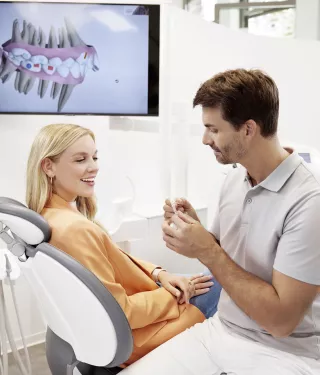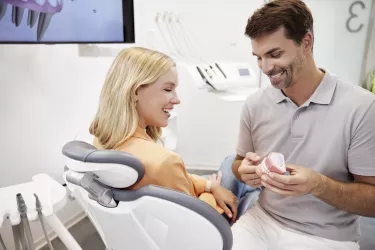DOCTOR-DIRECTED VS. DIRECT-TO-CONSUMER
What’s the difference between clear aligner brands that are doctor-directed versus direct-to-consumer? Discover more & learn how to decide what’s best for you.

The Difference Between Clear Aligner Treatments
With the advent of clear aligners, it’s now easier than ever to achieve the smile of your dreams. However, not all aligners are created equal. There are two approaches to using various clear aligner brands: doctor-directed and direct -to-consumer (or DIY aligners).
So, what’s the difference between the two, and which type of treatment is better? Check out our chart below to learn more about the pros and cons of each style so you can choose the best teeth aligners for you.
Doctor-Directed Aligners
Cavities
Many cavities are hard to detect without a proper dental exam. A doctor will ensure that your teeth and gums are healthy.3
Bite Problems
An essential part of proper tooth alignment is your bite. Your top teeth are meant to overlap your bottom teeth a little bit, and your back teeth must touch. That’s not something you can see through photos and video. You must have an in-person exam to confirm bite alignment — not just tooth alignment.1
Root and Bone Health
Your doctor will use X-rays to evaluate and monitor your tooth roots and surrounding bone to ensure that the teeth are being moved in a way that keeps your teeth and bone healthy during treatment.
Direct-To-Consumer Aligners
Cavities
D2C clear aligner brands don’t require an exam — just photos and at-home impressions. As a result, they miss cavities that aren’t clearly visible.1
Bite Problems
Many people have used D2C aligners and successfully achieved straighter teeth but later realised their bite is no longer aligned. Their jaw is skewed, or their back teeth no longer touch at all! The reason for this result is clear aligner brands that lack the guidance and hands-on support of a physician.2,3
Root and Bone Health
Without X-rays, it can not be determined whether your teeth can be moved without causing harm to the roots and surrounding bone. D2C treatment plans cannot account for any root and bone abnormalities before and during treatment, which may result in loss of important tooth and bone structure.
Get Started Today
Find a Spark Provider today to learn more about the personalised treatment you’ll receive with our clear aligner brand.

